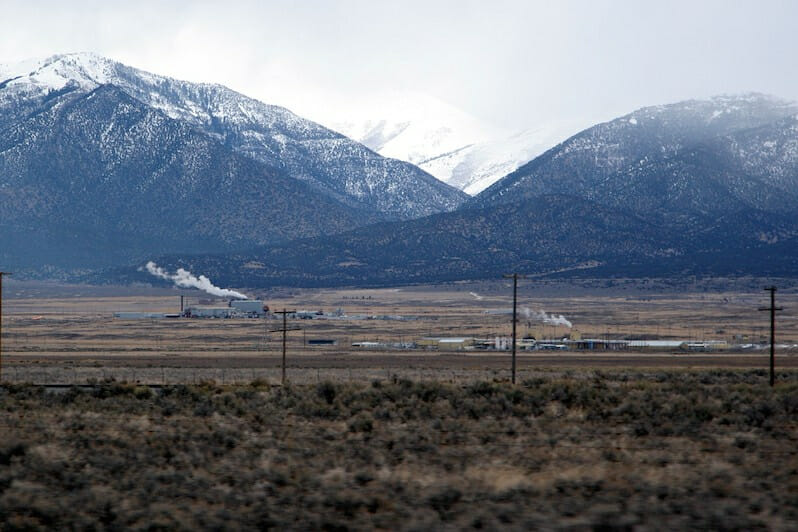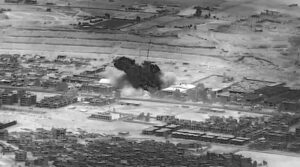How Toxic Waste Sites Run by the Pentagon Are Poisoning Americans
A report by ProPublica reveals how the military is using unsafe methods to destroy hazardous waste at sites across the country. (Pictured, nerve gas incinerators in Utah.) Nerve gas incinerators at Tooele Army Depot in Utah, a site used to demilitarize munitions. (Dave Merrill / CC 2.0)
Nerve gas incinerators at Tooele Army Depot in Utah, a site used to demilitarize munitions. (Dave Merrill / CC 2.0)
Nerve gas incinerators at Tooele Army Depot in Utah, a site used to demilitarize munitions. (Dave Merrill / CC 2.0)
A detailed new report by ProPublica reveals how the U.S. military continues to engage in unsafe methods to destroy hazardous waste at sites across the country, and how this practice is harming nearby communities. The story, which is “the first in a series examining the Pentagon’s oversight of thousands of toxic sites on American soil,” exposes how “outdoor burning and detonation is still the military’s leading method for dealing with munitions and the associated hazardous waste.”
Abrahm Lustgarten writes:
More than three decades ago, Congress banned American industries and localities from disposing of hazardous waste in these sorts of “open burns,” concluding that such uncontrolled processes created potentially unacceptable health and environmental hazards. Companies that had openly burned waste for generations were required to install incinerators with smokestacks and filters and to adhere to strict limits on what was released into the air. Lawmakers granted the Pentagon and its contractors a temporary reprieve from those rules to give engineers time to address the unique aspects of destroying explosive military waste.
That exemption has remained in place ever since, even as other Western countries have figured out how to destroy aging armaments without toxic emissions. While American officials are mired in a bitter debate about how much pollution from open burns is safe, those countries have pioneered new approaches. Germany, for example, destroyed hundreds of millions of pounds of aging weapons from the Cold War without relying on open burns to do it.
In the United States, outdoor burning and detonation is still the military’s leading method for dealing with munitions and the associated hazardous waste. It has remained so despite a U.S. Senate resolution a quarter of a century ago that ordered the Department of Defense to halt the practice “as soon as possible.” It has continued in the face of a growing consensus among Pentagon officials and scientists that similar burn pits at U.S. bases in Iraq and Afghanistan sickened soldiers.
Federal records identify nearly 200 sites that have been or are still being used to open-burn hazardous explosives across the country. Some blow up aging stockpile bombs in open fields. Others burn bullets, weapons parts and […] raw explosives in bonfire-like piles. The facilities operate under special government permits that are supposed to keep the process safe, limiting the release of toxins to levels well below what the government thinks can make people sick. Yet officials at the Environmental Protection Agency, which governs the process under federal law, acknowledge that the permits provide scant protection.
ProPublica obtained internal EPA documents and interviewed numerous officials for this investigative report. Lustgarten writes that while the Pentagon defends its practices as “legal” and “safe,” the “EPA’s system for determining how much chemical burning is safe amounts to little more than educated guesses.”
“ProPublica reviewed records for the 51 active burn sites and more than 145 others the Pentagon, its contractors, and other private companies operated in the past, and found they had violated their hazardous waste handling permits thousands of times over the past 37 years, often for improperly storing and disposing of toxic material, and sometimes for exceeding pollution thresholds,” Lustgarten reports. “Much of the information gathered has never before been released to the public, leaving the full extent of military-related pollution a secret.”
Read the full report here, and take a look at corresponding interactive maps here.
—Posted by Emma Niles
Your support matters…Independent journalism is under threat and overshadowed by heavily funded mainstream media.
You can help level the playing field. Become a member.
Your tax-deductible contribution keeps us digging beneath the headlines to give you thought-provoking, investigative reporting and analysis that unearths what's really happening- without compromise.
Give today to support our courageous, independent journalists.








You need to be a supporter to comment.
There are currently no responses to this article.
Be the first to respond.